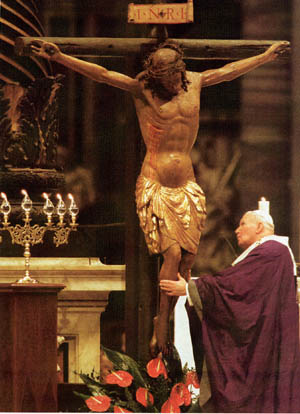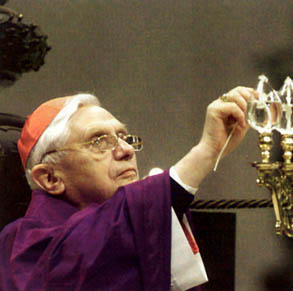�Even if the Inquisition was not as bad as historians have portrayed it, there were still some abuses. Doesn�t it show humility and honesty on the part of the Pope to ask pardon for the wrong things the Church may have done?� Jan argued. �Doesn�t it set a good example for us, since that�s what we teach our children to do � apologize when we do something wrong?�
 |
JPII at a Request for Pardon religious service on March 12, 2000. He asked pardon for the Church's past hostility toward followers of other religions, for the Crusades, Inquisition, etc. Inside the Vatican, January 2001 |
The Church, as an institution, is pure and sinless, founded by Christ and preserved by God to be free of error, both in the past and in the present. It is only individual Church members, be they Popes, Bishops or the simple faithful, who sin.
This is the authentic teaching of the Church, Jan, as you and I learned it. But do your children or their friends realize this? Or is there some confusion in their minds caused by the constant papal apologies for the past �sins of the Church�? If you analyze these apologies carefully, you can see that most of them insert a short line, a footnote, or a parenthetical phrase attributing the fault to the members of the Church. For the scholars and theologians, therefore, the rule is maintained: no error of the Church but only of her members. However, it is the general line of the apology that normally remains in the minds of the faithful: the Church is sinful. In face of this contradiction, one cannot help but wonder: Is it the Vatican�s intention to cause this second impression?
At any rate, what sticks in the mind of so many Catholics, especially young ones schooled in �Vatican II catechism,� is that the Church made mistakes and even sinned in her past, so now the correct action for the Church is to repent and do penance. This would justify the continuous reform in customs and institutions we have seen since Vatican II. It explains why the Church would supposedly need new structures, because the old would be inherently flawed.
If we had a contaminated Church, which we do not, then we have a Church in need of evaluation and change, uncertain in her teaching. Yesterday she made a mistake. Today she corrects it and repents for her past. Tomorrow, well, who knows what tomorrow will bring as the Church evolves?
 |
At the same ceremony Cardinal Ratzinger lights a lamp asking pardon for sins of intolerance, one of the seven petitions for forgiveness. Inside the Vatican, January 2001 |
It is not difficult to understand from this that the Church would need a continual reform, as interpreted by Karl Rahner and Yves Congar and so many other progressivist ecclesiastics. Such theologians, suspect for heresy before Vatican II, have suddenly become the experts who cannot be questioned, even though their bad theology did not change. They are the ones who need to make apologies for their past and repent. But they have not. Instead, they are demanding the Church do exactly that: make apologies for her past and repent.
When the Pope apologizes for the past sins of the Church, he does not appear at all like one being humble and honest. He is implicitly affirming a new conception of the Church, and also the Faith, one constantly reforming, changing, and evolving.
I hope this explains, Jan, why there is something profoundly wrong with the Pope�s apology for the Inquisition and for so many other past militant actions of the Holy Catholic Church.

No comments:
Post a Comment